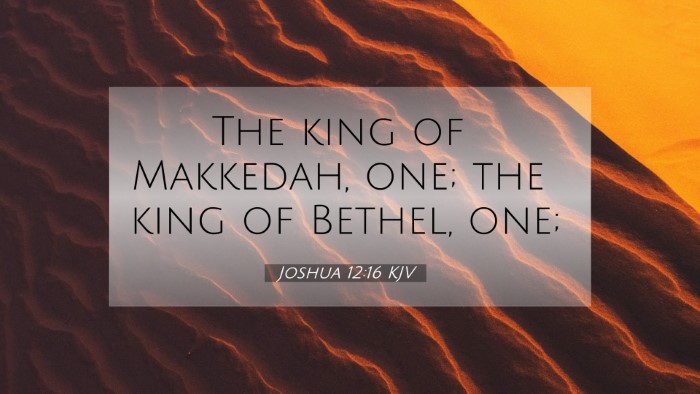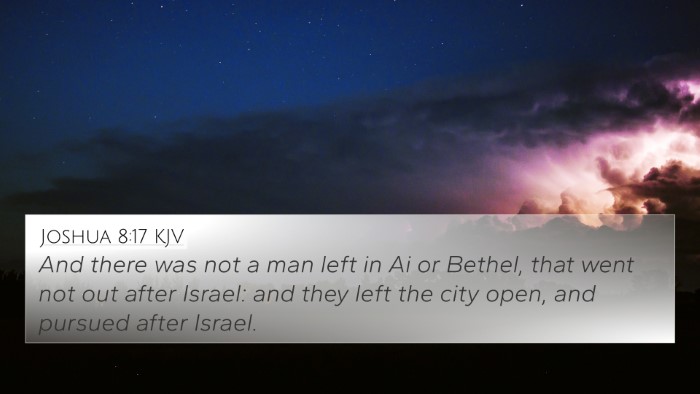Understanding Joshua 12:16
Joshua 12:16 states: “The king of the city of Lachish, one; the king of Eglon, one;” This verse is part of a record that lists the conquered kings in Canaan as the Israelites settled the Promised Land. The significance of this verse lies in its presentation of the achievements of Israel under Joshua’s leadership.
Verse Context and Analysis
The context of Joshua 12 centers on the distribution of land and the conquest of various kings. This verse specifically highlights two kings, Lachish and Eglon, emphasizing the military victories at these strategic locations.
Commentary Insights
-
Matthew Henry’s Commentary:
Henry notes that the listing of conquered kings showcases God’s sovereignty and the fulfillment of His promises to Israel. Each conquered king represents a victory not just for Joshua but also for the faith and obedience of the Israelites. The repetition of “one” emphasizes God's singular power over the many foes of Israel.
-
Albert Barnes’ Notes:
Barnes points out that Lachish was one of the most fortified cities of Canaan and its capture exemplifies the power of God working through Israel. The mention of Eglon further indicates the thoroughness of the conquest—both cities had significant roles in the region and their defeat symbolizes the impending dominion of Israel across Canaan.
-
Adam Clarke's Commentary:
Clarke discusses the historical implications of the conquests referred to in this verse. He mentions how these cities went on to represent significant spiritual and geographical landmarks in biblical history. The verse serves as a reminder of the reality of war during the Israelites' journey and how these conquests were pivotal in establishing the Promised Land, further hinting at future struggles that would arise in those same regions.
Thematic Connections
This verse can be cross-referenced with other passages that reflect on victory, conquest, and divine assistance. Below are several relevant verses:
- Joshua 10:32: Highlights the Lord's help in the conquest of cities.
- Exodus 23:30: Discusses God’s promise of gradual conquest of the land.
- Joshua 1:3-5: Affirms God's promise to Israel of land and victory.
- Deuteronomy 7:2: Instructs the Israelites on taking possession of the land.
- Psalm 44:3: Praises God for the victories given to Israel.
- Romans 8:31: Affirms that if God is for us, who can be against us?
- Hebrews 11:30: Refers to the faith of Israel that led to the walls of Jericho falling.
Connections Between Bible Verses
The connections between verses signify the overarching narrative of God's guidance and the importance of faith and obedience. The cumulative successes signify a fulfilled promise and illustrate a pattern of divine intervention. These passages collectively serve as theological pillars that validate the account of Joshua's leadership:
- Cross-referencing Biblical texts allows for an engaging understanding of thematic superiority in spiritual warfare.
- Linking Bible scriptures creates a more profound comprehension of God’s providence and promises.
- Each cited scripture themes around victory through faith emphasize the importance of trusting in God’s plan.
Similar Themes in Other Scriptures
Thematic Bible verse connections often lead to insights concerning faith, obedience, and divine promise. For further understanding:
- Isaiah 54:17: “No weapon formed against you shall prosper.” This verse reflects God’s protection over His people.
- Philippians 4:13: “I can do all things through Christ who strengthens me.” A reminder of strength through faith.
- 1 Corinthians 15:57: “But thanks be to God, who gives us the victory through our Lord Jesus Christ.” Celebrating the ultimate victory through Christ.
Tools for Bible Cross-Referencing
For deeper exploration of cross-references, various tools are available:
- Using a Bible concordance helps identify themes and connections.
- Bible cross-reference guides assist in exploring verses that relate to each other.
- Engaging in cross-reference Bible studies can reveal underlying themes across the scriptures.
Conclusion
In summary, Joshua 12:16 serves not only as a historical account but also as a reminder of God’s faithfulness in fulfilling His promises to Israel. Understanding its meaning through public domain commentaries enhances our comprehension of biblical themes and the interconnectedness of scriptural narratives. This verse stands alongside many within the Bible in illustrating the importance of divine support in the face of opposition, urging believers to seek God’s will actively and trust in His unfailing provision.







